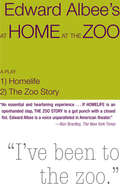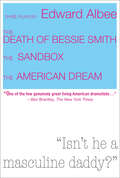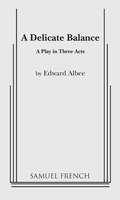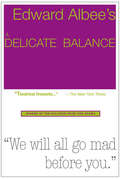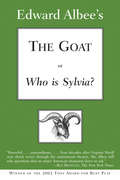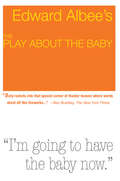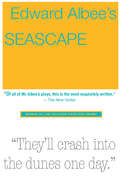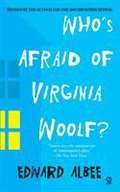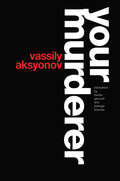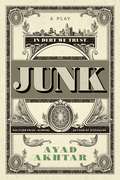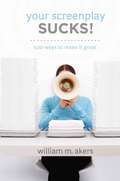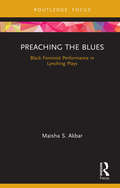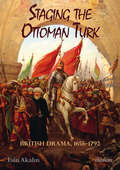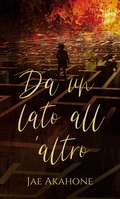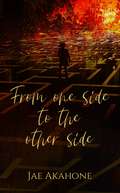- Table View
- List View
At Home at the Zoo: Homelife and the Zoo Story
by Edward Albee“I’ve been to the zoo.” These opening words usher the audience into one of the most iconic plays in American theater history: The Zoo Story. More than fifty years later, master playwright Edward Albee (Who’s Afraid of Virginia Woolf? and The Goat, or Who is Sylvia?) wrote a prequel to this classic. Home Story contains the events in Peter’s life immediately preceding his encounter with Jerry on the park bench and is every bit as powerful as the original. We meet Ann, Peter’s wife, and see the conversation that compelled Peter to go for that fateful walk in the park. For the first time collected in one volume, At Home at the Zoo is a must for any theater lover.
At Home at the Zoo: Homelife and the Zoo Story
by Edward Albee"I've been to the zoo." These opening words usher the audience into one of the most iconic plays in American theater history: The Zoo Story. More than fifty years later, master playwright Edward Albee (Who's Afraid of Virginia Woolf? and The Goat, or Who is Sylvia?) wrote a prequel to this classic. Home Story contains the events in Peter's life immediately preceding his encounter with Jerry on the park bench and is every bit as powerful as the original. We meet Ann, Peter's wife, and see the conversation that compelled Peter to go for that fateful walk in the park. For the first time collected in one volume, At Home at the Zoo is a must for any theater lover.
At Home at the Zoo
by Edward AlbeeThese opening words usher the audience into one of the most iconic plays in American theatre history: The Zoo Story. More than fifty years later, master playwright Edward Albee (Who's Afraid of Virginia Woolf? and The Goat, or Who is Sylvia?) wrote a prequel to his classic. Home Life contains the events in Peter's life immediately preceding his encounter with Jerry on the park bench and is every bit as powerful as the original. We meet Ann, Peter's wife, and see the conversation that compelled Peter to go for that fateful walk in the park. For the first time collected in one volume, Edward Albee's At Home at the Zoo is a must for any theatre lover.
Death of Bessie Smith, the Sandbox, and the American Dream: The Death of Bessie Smith, The Sandbox, The American Dream
by Edward AlbeeThis new collection features three acclaimed one-act plays from Edward Albee's early years. With the initial productions of The Death of Bessie Smith, The Sandbox, and The American Dream, Albee consolidated his reputation as a brilliant new talent of the New York theater scene. These three plays tackle major themes such as race relations, American family life, and the essence of theater itself -- each of which still continue to resonate. Representing the bold and exciting periods in the then young career of widely consideredAmerica's most popular and imaginative playwrights, this edition is a must-have for theater lovers.
A Delicate Balance
by Edward AlbeeEdward Albee. Full Length, Drama . Characters: 2 male, 4 female . Interior Set . This Pulitzer Prize winner enjoyed a stunning Broadway revival in 1996 with George Gizzard, Rosemary Harris and Elaine Stritch. Wealthy middle-aged couple, Agnes and Tobias have their complacency shattered when Harry and Edna, longtime friends appear at their doorstep. Claiming an encroaching, nameless "fear" has forced them from their own home, these neighbors bring a firestorm of doubt, recrimination and ultimately solace, upsetting the "delicate balance" of Agnes and Tobias' household.. Winner of the 1996 Drama Desk and Award, Best Revival. . "Powerful...A beautiful play filled with humor and compassion, and touched with poetry...[with] the stature and eloquence of a classic."-New York Daily News . "A brilliant play."-New York Post . "An evening of theatrical fireworks."-The New York Times
A Delicate Balance
by Edward AlbeeOne of Edward Albee's most celebrated works, A Delicate Balance premiered on Broadway in 1966 and won the Pulitzer Prize for Drama in 1967, the first of three he has received for his work. The play revolves around wealthy middle-aged couple Agnes and Tobias, who have their complacency shattered when their longtime friends Harry and Edna appear at their doorstep. Claiming an encroaching, nameless "fear" has forced them from their own home, these neighbors bring a firestorm of doubt, recrimination and ultimately solace, upsetting the "delicate balance" of Agnes and Tobias's household. In recent years, A Delicate Balance has enjoyed many and new stunning revivals, running now, including a Broadway production in 1996, which won the Tony Award for Best Revival, and another at the Alameida Theatre in London in 2011.
The Goat, or Who Is Sylvia?: Broadway Edition
by Edward Albee“Four decades after Virginia Woolf sent shock waves through the mainstream theatre, Mr. Albee still asks questions that no other major American dramatist dares to ask." –Ben Brantley, The New York Times Three-time Pulitzer Prize-winner Edward Albee’s most provocative, daring, and controversial play since Who's Afraid of Virginia Woolf, The Goat won all the major awards for best new play of the year (Tony, New York Drama Critics Circle, Drama Desk, and Outer Critics Circle). In the play, Martin-a hugely successful architect who has just turned fifty-leads an ostensibly ideal life with his loving wife and gay teenage son. But when he confides to his best friend that he is also in love with a goat (named Sylvia), he sets in motion events that will destroy his family and leave his life in tatters. The playwright himself describes it this way: “Every civilization sets quite arbitrary limits to its tolerances. The play is about a family that is deeply rocked by an unimaginable event and how they solve that problem. It is my hope that people will think afresh about whether or not all the values they hold are valid.”
The Goat, or Who Is Sylvia?: Broadway Edition
by Edward Albee"Four decades after Virginia Woolf sent shock waves through the mainstream theatre, Mr. Albee still asks questions that no other major American dramatist dares to ask." -Ben Brantley, The New York Times Three-time Pulitzer Prize-winner Edward Albee's most provocative, daring, and controversial play since Who's Afraid of Virginia Woolf, The Goat won all the major awards for best new play of the year (Tony, New York Drama Critics Circle, Drama Desk, and Outer Critics Circle). In the play, Martin-a hugely successful architect who has just turned fifty-leads an ostensibly ideal life with his loving wife and gay teenage son. But when he confides to his best friend that he is also in love with a goat (named Sylvia), he sets in motion events that will destroy his family and leave his life in tatters. The playwright himself describes it this way: "Every civilization sets quite arbitrary limits to its tolerances. The play is about a family that is deeply rocked by an unimaginable event and how they solve that problem. It is my hope that people will think afresh about whether or not all the values they hold are valid."
The Goat or Who is Sylvia?
by Edward AlbeeOn his 50th birthday, Martin, a world-famous architect prepares for a recorded interview by an old friend in the TV business; but in the course of the conversation a secret emerges that threatens to turn celebration to tragedy. The Goat is hugely enjoyable parable that plumbs the deepest questions of social constraints on the individual expression of love. "My plays are an examination of the American Scene, an attack on the substitution of artificial for real values in our society, a condemnation of complacency, cruelty and emasculation and vacuity, a stand against the fiction that everything in this slipping land of ours is peachy keen" - Edward Albee Winner of the 2001 Tony Award for Best Play Shortlisted for the Pulitzer Prize for Drama, 2002
Play About the Baby: Trade Edition
by Edward AlbeeWinner of three Pulitzer Prizes for Drama during his long and distinguished career, Edward Albee is one of America’s preeminent playwrights. The Play About the Baby is an absurdist black comedy, reminiscent of burlesque in its high spirits and banter, that grapples with such issues as reality and the games we play to define it, the ambiguity of existence, and the agonizing bonds between parents and children. A fresh young couple—Boy and Girl—have a new baby, whom an older couple—Man and Woman—have come to steal. Why? Because, as Man says, “If you don’t have the wound of a broken heart, how can you know you’re alive?” Brutal loss—the loss of a child or childhood self—has been a recurring Albee theme, and Ben Brantley of the New York Times summed up the critical reaction to The Play About the Baby when he called it a “funny, harrowing dramatic fable … as explicit and concise a statement of what Mr. Albee believes as he is ever likely to deliver.”
Play About the Baby: Trade Edition
by Edward AlbeeWinner of three Pulitzer Prizes for Drama during his long and distinguished career, Edward Albee is one of America's preeminent playwrights. The Play About the Baby is an absurdist black comedy, reminiscent of burlesque in its high spirits and banter, that grapples with such issues as reality and the games we play to define it, the ambiguity of existence, and the agonizing bonds between parents and children. A fresh young couple--Boy and Girl--have a new baby, whom an older couple--Man and Woman--have come to steal. Why? Because, as Man says, "If you don't have the wound of a broken heart, how can you know you're alive?" Brutal loss--the loss of a child or childhood self--has been a recurring Albee theme, and Ben Brantley of the New York Times summed up the critical reaction to The Play About the Baby when he called it a "funny, harrowing dramatic fable ... as explicit and concise a statement of what Mr. Albee believes as he is ever likely to deliver."
The Play About the Baby
by Edward AlbeeThe Play About the Baby is an absurdist black comedy from one of America's premier dramatists. Reminiscent of burlesque in its high spirits and banter, the play focuses on a fresh young couple who are visited by an older man and woman, who have come to steal their child. Grappling with the agonizing bonds between parents and children, The Play About the Baby is a wicked, concise and provocative summation of the themes that have guided Albee's legendary career.
Seascape
by Edward AlbeeDealing with an almost surreal Howard Hughes-like figure, a bearded recluse who is the richest man in the world, this often comic and brilliantly revealing allegory continues the playwright's preoccupation with the mythic aspects of American life. <P><P> Pulitzer Prize Winner
Seascape: The Entire Appalling Business
by Edward Albee“Hats off, and up in the air! A major dramatic event.” The New York Times On the heels of the success of Edward Albee’s The Collected Plays of Edward Albee, Overlook brings back—in a stand-alone volume—one of Albee’s most cherished plays, a fantastic story of what it means to be alive—winner of the 1975 Pulitzer Prize for Drama. On a deserted stretch of beach, a middle-aged couple relaxes after a picnic lunch and converse idly about home, family, and their life together. She sketches; he naps. Then, suddenly, they are joined by two sea creatures, a pair of lizards from the depths of the ocean, with whom they engage in a fascinating dialogue. The emotional and intellectual reverberations of this bizarre conversation will linger in the heart and the mind long after the curtain falls—or the last page is turned.
Three Tall Women
by Edward AlbeeAlbee’s frank dialogue about everything from incontinence to infidelity portrays aging without sentimentality. His scenes are charged with wit, pain, and laughter, and his observations tell us about forgiveness, reconciliation, and our own fates. But it is his probing portrait of the three women that reveals Albee’s genius.
Who's Afraid of Virginia Woolf?
by Edward Albee"Twelve times a week," answered Uta Hagen, when asked how often she'd like to play Martha in Who's Afraid of Virginia Woolf? Like her, audiences and critics alike could not get enough of Edward Albee's masterful play. A dark comedy, it portrays husband and wife George and Martha in a searing night of dangerous fun and games. By the evening's end, a stunning, almost unbearable revelation provides a climax that has shocked audiences for years. With the play's razor-sharp dialogue and the stripping away of social pretense, Newsweek rightly foresaw Who's Afraid of Virginia Woolf? as "a brilliantly original work of art-an excoriating theatrical experience, surging with shocks of recognition and dramatic fire [that] will be igniting Broadway for some time to come."
Extramural Shakespeare
by Denise AlbaneseThis study argues that Shakespeare can now be understood as part of public culture. Thanks to the emergence of mass education in the twentieth century, Albanese argues that Shakespeare has become a shared property, despite the depiction of his texts as 'elite' cultural objects in the film industry.
Your Murderer (Russian Theatre Archive Ser. #Vol. 18.)
by Vassily AksyonovFrom Russia comes this ironic, satirical, multi-layered, modern pop-art parable by Vassily Aksyonov. Your Murderer is a richly grotesque hodgepodge of different linguistic levels that defies all rules and mixes a powerful cocktail out of traditional slogans, invented obscentities, foreign words and phrases, terminology from sports and heavy drinking, and pure nonsense. Daniel Gerould is Lucille Lortel Distinguished Professor of Theater and Comparative Literature at the City University of New York. He is the Editor of Slavic and East European Performance and of harwood academic publishers's Polish and East European Theater Archive series. Your Murderer comes from Russia and is an ironic, satirical, multi-layered, modern pop-art parable - richly grotesque and on different linguistic levels. that defies all rules, mixing a powerful cocktail out of traditional slogans, invented obscentities, foreign words and phrases, terminology from sports and heavy drinking, and pure nonsense.
Slaves and Slavery in Ancient Greek Comic Drama
by Ben Akrigg Rob TordoffHow did audiences of ancient Greek comedy react to the spectacle of masters and slaves? If they were expected to laugh at a slave threatened with a beating by his master at one moment but laugh with him when they bantered familiarly at the next, what does this tell us about ancient Greek slavery? This volume presents ten essays by leading specialists in ancient Greek literature, culture and history, exploring the changing roles and representations of slaves in comic drama from Aristophanes at the height of the Athenian Empire to the New Comedy of Menander and the Hellenistic World. The contributors focus variously on individual comic dramas or on particular historical periods, analysing a wide range of textual, material-culture and comparative data for the practices of slavery and their representation on the ancient Greek comic stage.
Junk: A Play
by Ayad Akhtar*Now on Broadway at Lincoln Center starring Steven Pasquale* From the Pulitzer Prize-winning author of Disgraced, a fast-paced economic thriller that exposes the financial deal making behind the mergers and acquisitions boom of the 1980s.Set in 1985, Junk tells the story of Robert Merkin, resident genius of the upstart investment firm Sacker Lowell. Hailed as "America's Alchemist," his proclamation that "debt is an asset" has propelled him to a dizzying level of success. By orchestrating the takeover of a massive steel manufacturer, Merkin intends to do the "deal of the decade," the one that will rewrite all the rules. Working on his broadest canvas to date, Pulitzer Prize winner Ayad Akhtar chronicles the lives of men and women engaged in financial civil war: insatiable investors, threatened workers, killer lawyers, skeptical journalists, and ambitious federal prosecutors. Although it's set 40 years in the past, this is a play about the world we live in right now; a world in which money became the only thing of real value.
Your Screenplay Sucks!: 100 Ways To Make It Great
by William M. AkersA lifetime member of the Writer's Guild of America who has had three feature films produced from his screenplays, Akers offers beginning writers the tools they need to get their screenplay noticed.
Preaching the Blues: Black Feminist Performance in Lynching Plays (Routledge Advances in Theatre & Performance Studies)
by Maisha S. AkbarPreaching the Blues: Black Feminist Performance in Lynching Plays examines several lynching plays to foreground black women’s performances as non-normative subjects who challenge white supremacist ideology. Maisha S. Akbar re-maps the study of lynching drama by examining plays that are contingent upon race-based settings in black households versus white households. She also discusses performances of lynching plays at Historically Black Colleges and Universities (HBCUs) in the South and reviews lynching plays closely tied to black school campuses. By focusing on current examples and impacts of lynching plays in the public sphere, this book grounds this historical form of theatre in the present day with depth and relevance. Of interest to scholars and students of both general Theatre and Performance Studies, and of African American Theatre and Drama, Preaching the Blues foregrounds the importance of black feminist artists in lynching culture and interdisciplinary scholarship.
Staging the Ottoman Turk: British Drama, 1656–1792
by Esin AkalınIn the wake of the fear that gripped Europe after the fall of Constantinople in 1453, English dramatists, like their continental counterparts, began representing the Ottoman Turks in plays inspired by historical events. The Ottoman milieu as a dramatic setting provided English audiences with a common experience of fascination and fear of the Other. The stereotyping of the Turks in these plays—revolving around complex themes such as tyranny, captivity, war, and conquests—arose from their perception of Islam. The Ottomans' failure in the second siege of Vienna in 1683 led to the reversal of trends in the representation of the Turks on stage. As the ascending strength of a web of European alliances began to check Ottoman expansion, what then began to dazzle the aesthetic imagination of eighteenth century England was the sultan's seraglio with images of extravaganza and decadence. In this book, Esin Akalin draws upon a selective range of seventeenth and eighteenth century plays to reach an understanding, both from a non-European perspective and Western standpoint, how one culture represents the other through discourse, historiography, and drama. The book explores a cluster of issues revolving around identity and difference in terms of history, ideology, and the politics of representation. In contextualizing political, cultural, and intellectual roots in the ideology of representing the Ottoman/Muslim as the West's Other, the author tackles with the questions of how history serves literature and to what extent literature creates history.
Da un lato all'altro
by Jae AkahoneRaccolta di due racconti. Declino: La sento nelle vene. La sento nella testa. Non mi abbandona mai. È probabilmente la più intensa sensazione al mondo. Anche la più strana. Allo stesso tempo, mi dà tanto benessere e tanto dolore. Mi pervade tutto il corpo. Mi fa girare la testa. Ne sono attratto in modo inesorabile. Anche se fa di tutto per uccidermi ogni giorno di più. Borderline: sono ubriaco di questa sensazione che percepisco quando, mi avvicino al punto di non ritorno. Ma ne sono ubriaco per una sola buona ragione. Semplicemente perché il tuo sguardo e la tua attenzione mi faranno rivivere come ogni volta, permettendomi di ricominciare daccapo. Sono ubriaco di te.
From one side to the other side
by Jae AkahoneIt's a series of two short stories. The first story is about someone who wants to wean from drugs and the second story takes place in a psychiatric hospital.
